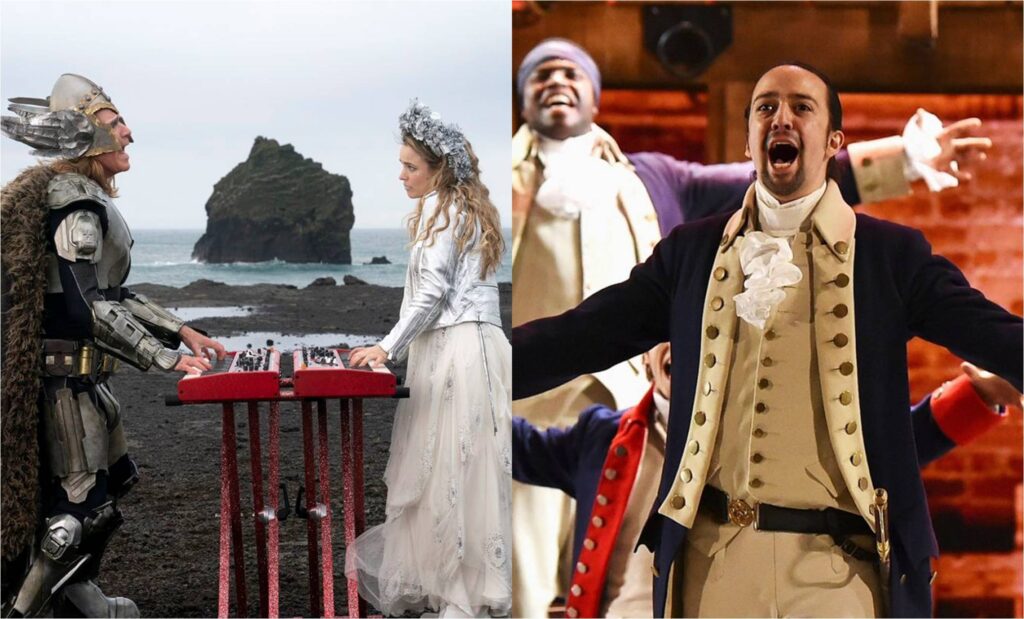
No movie is literally realistic. People’s actual lives are not filmed by professional camera crews, nor are their conversations scripted. Even adherents of Dogme 95 accept a certain degree of manipulation when they watch movies; it’s the implicit contract between the artist and the viewer. Still, if any genre challenges the assumptions inherent in this contract, it’s the musical. Our preconditioned brains may not immediately perceive that most cinematic dialogue is far more polished than everyday speech, but we damn sure notice when characters suddenly break into song.
It’s this theatricality, I assume, which animates the canard that musicals are unrealistic. Of course they’re unrealistic… and so is every other movie you’ve ever seen. The best musicals—my own list would include A Star Is Born (1954), The Umbrellas of Cherbourg, Aladdin, and, yes, La La Land—lean into their heightened stature, using song and dance to emphasize their characters’ emotions; in the process, they turn artifice into art. Nevertheless, it’s fascinating to consider the two most recent musicals to arrive in American theaters on streaming networks, and how they relate to the genre at large. Netflix’s Eurovision Song Contest: The Story of Fire Saga, the new vehicle for Will Ferrell’s outlandish shenanigans, and Disney’s Hamilton, the not-so-new phenomenon that you surely don’t need me to describe, are decidedly different movies—not just in terms of tone, but in how they depict music being performed on screen.
Of the two, Eurovision is probably the more conventional picture, which seems odd, given that it makes room for a subplot involving vengeful, invisible elves. Yet the film’s structure, which involves the tribulations of an Icelandic duo called Fire Saga as they strive to win the titular competition, ensures that all of the songs are organic rather than fantastical. When Lars (Ferrell) and his partner, Sigrit (a delightful Rachel McAdams), perform their tunes, they aren’t in the grips of imaginary creative forces compelling them to warble and wail; they’re just singing, like any other aspiring musician.
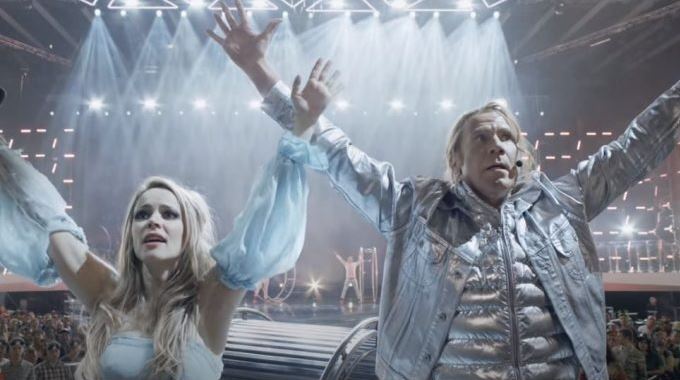
This is hardly a problem; plenty of great musicals employ the same approach. But there’s a deflating sense of laziness to Eurovision, which often feels more like a stretched-out concept than a feature. This may explain why the characters are so appallingly thin. Lars’ primary trait is the lifelong desire to impress his glowering father (Pierce Brosnan); Sigrit’s primary trait is the lifelong desire to impress Lars, because this is absolutely the kind of movie where a beautiful woman is smitten with Will Ferrell. They’re both widely mocked for their enthusiasm, and together they dream of winning Eurovision, not so much for the fame it would bring as for the validation that they crave from their families and peers.
This is all boilerplate, which is fine; after all, you don’t watch a film written by Ferrell (along with Andrew Steele) and directed by David Dobkin (Wedding Crashers) and expect narrative complexity. You do hope to laugh a lot, but the comedy of Eurovision Song Contest is largely flat. There are some funny lines; I enjoyed Lars constantly clarifying that Sigrit is “probably” not his sister, as well as his passing mention of a storied folk duo, “Semen and Garfunkel.” But most of the humor is childish—not in the sense that it’s vulgar, but that it isn’t innovative. Instead, the jokes seem to operate as earnest observations of obvious phenomena. Icelanders have silly accents. Americans are self-centered idiots. Those statues have large penises. Dan Stevens is hot. Get it?
The happy exception to this is McAdams, who manages to embrace and elevate the movie’s absurdity in a way that seems sincere rather than arch. Sigrit isn’t a very well-rounded character on the page, but McAdams imbues her with a resolve that’s oddly touching. She also earns the film’s biggest laugh—an anguished delivery of the line, “The elves went too far!”—while bringing a sense of genuine star power to the musical performances.
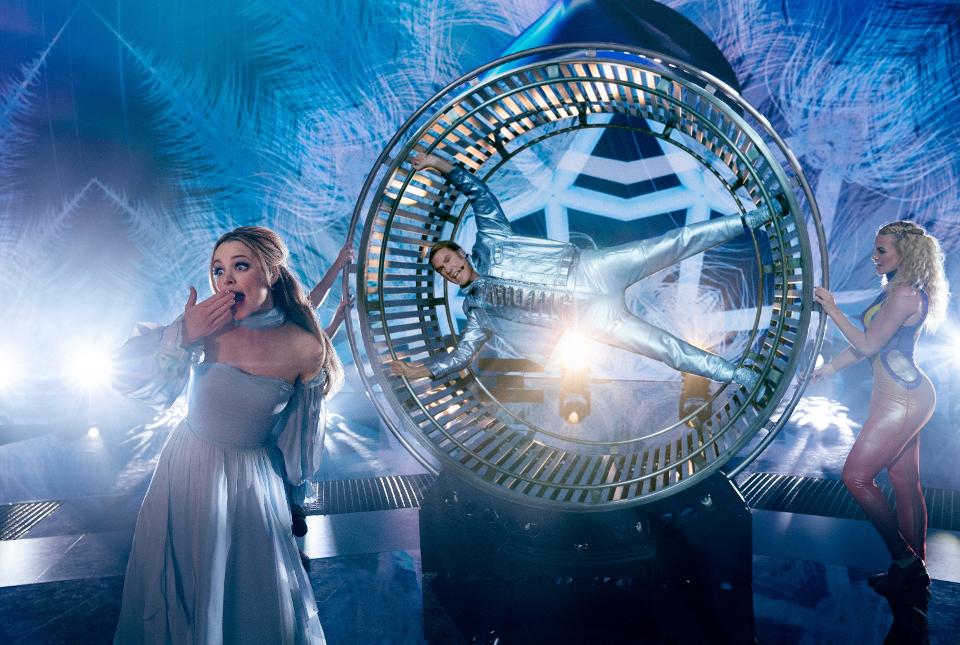
And it’s there, thankfully, where Eurovision Song Contest replenishes some of its squandered goodwill. The songs themselves aren’t all that special; the melodies aren’t very memorable, and many of the lyrics are stupid. (This is sometimes intentional, as on “Ja Ja Ding Dong”, which features lines like “My love for you is growing wide and long / I swell and burst when I see what we’ve become”; amusingly, it’s the only song that Fire Saga’s local crowds seem to like.) But there’s a real sense of creative joy underlying the musical sequences, a spark of vitality that’s missing from the rest of the picture. This is bolstered by the sonic variety: There’s “Volcano Man”, a fanciful glam-rock number featuring Lars and Sigrit striding through desolate Nordic landscapes; “Running with the Wolves,” a nü-metal banger that looks and sounds like the fan-made soundtrack to World of Warcraft; “Song-a-Long,” a celebrity-laden medley that isn’t quite as inspired as the riff-off scene in Pitch Perfect; and “Double Trouble”, a sturdy pop duet whose tragic wardrobe malfunction is teased out brilliantly. (The costumes in general are a highlight.) By the time Sigrit breaks out into “Húsavik”, a sweeping ode to Fire Saga’s hometown that incorporates twinges of Sigur Rós (McAdams’ own vocals were mixed with those of Molly Sandén), you’re ready to cast your vote for Iceland.
Watching Fire Saga’s performance of “Double Trouble”, a bemused Graham Norton comments that it’s “not as bad as we expected”. It’s faint praise, but it feels appropriate for Eurovision Song Contest, a film that’s as harmless as it is slight. It doesn’t do anything all that interesting with the movie musical, but it does have interesting music. I can’t be too hard on it. After all, not every musical can revolutionize the genre and recontextualize America’s history of racial oppression by casting actors of color to play the nation’s white founding fathers and perform dizzying feats of hip-hop. Speaking of which…
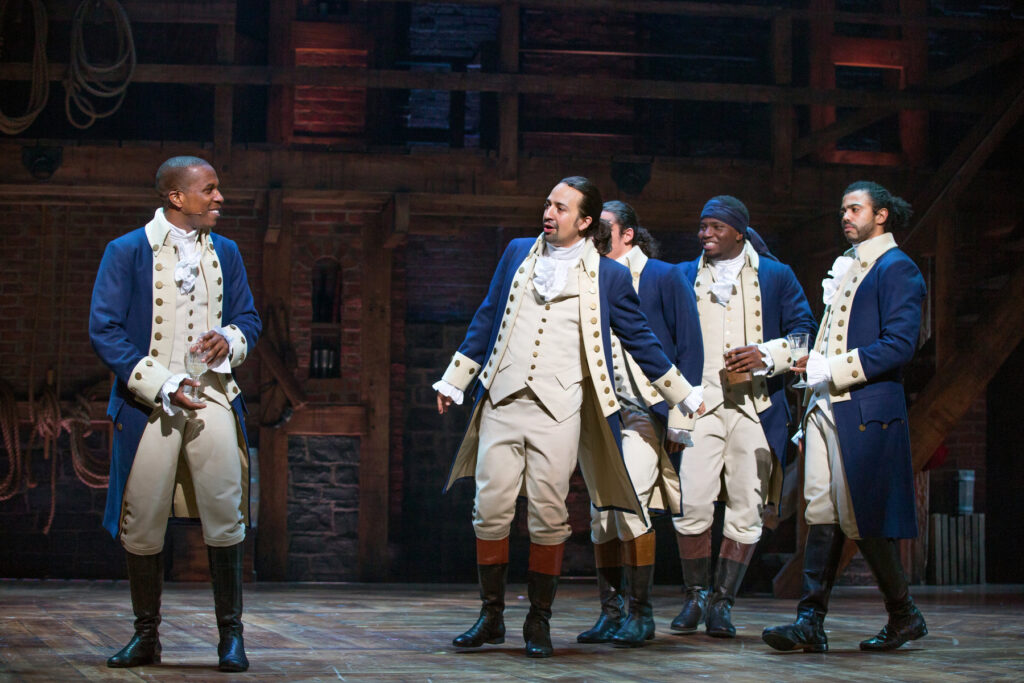
At this point, Hamilton is less a piece of popular art than a component of personal identity. Perhaps my data is purely anecdotal, but most conversations about Lin-Manuel Miranda’s play don’t center on its merits; rather, its greatness is simply assumed, and the discourse revolves around the particular way in which you absorbed said greatness. Where did you see it? How many times? Was it with the original cast? How were your seats? Have you memorized the soundtrack? Were you in the room where it happened?
The sheer breadth of this cultural seepage makes the recent release of Hamilton on Disney+ a curious thing. Just what is it, exactly? At one point, Miranda’s Alexander Hamilton describes himself as a polymath, and Hamilton itself appears to be somewhat polymorphic. It’s a movie that’s also a play. It’s a new production that’s also a collection of four-year-old footage. (Specifically, the Disney cut splices together three different Broadway performances from June 2016, along with rehearsal recordings that were shot in anticipation for use in a future feature.) It’s a live viewing that you can pause whenever you like.
My chief consideration, when I clicked “Play” on my Disney+ app at 1:01 a.m. on July 3, wasn’t so much whether Hamilton was a good movie as whether it felt like a movie at all. Could a digitized copy of a live theatrical performance, no matter how polished, really work as a piece of cinema? Could I make myself susceptible to the classic, you-are-there illusion of motion pictures—the time-honored magic trick that merges your mind with the screen—when my television showcased an actual audience that really was there?
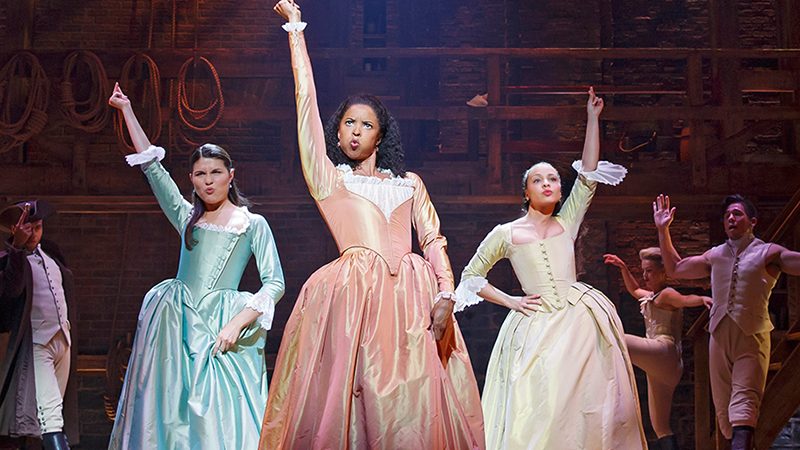
The answers to these questions proved to be a thunderous… mostly. I can’t pretend that my brain wasn’t consistently aware of the peculiar realities of Hamilton’s production. Certain features endemic to the stage—the actors’ mics, the audience’s applause, the shifting spotlights, the entrances and exits from the wings—can hardly be ignored. It is impossible to watch this film without recognizing that what you’re watching was, in fact, filmed.
But again, realism isn’t necessarily a goal of movies, and certainly not of musicals. Certain meta moments, such as the lyric “I’m so blue” inducing a change in the lighting’s tint, are appealing precisely because they draw attention to themselves. And there’s always a vicarious thrill in watching performers at risk, such as when an actor pulls off a quiet stunt with a tablecloth.
More importantly, this Hamilton impresses as a piece of technical craftsmanship. Any fears that Disney would subject us to static footage of a tripod pointed at a stage can be disregarded. Thomas Kail, whose direction of the original play landed him one of its 11 Tonys, has stitched together a final cut that moves with surprising visual verve. The camerawork is nimble and versatile—there are close-ups, medium shots, wide compositions, even an occasional god’s-eye view from above—and its careful style can only be called cinematography. Likewise, the editing is, well, editing; there’s a purposefulness to the cutting that goes beyond Kail simply selecting which camera (and which performance) to highlight at a particular time. Strangely, the filmmaking choices here feel more assertive than those of Eurovision Song Contest, which mostly relies on the variety of its soundtrack and the charm of its actors rather than developing any aesthetic personality.
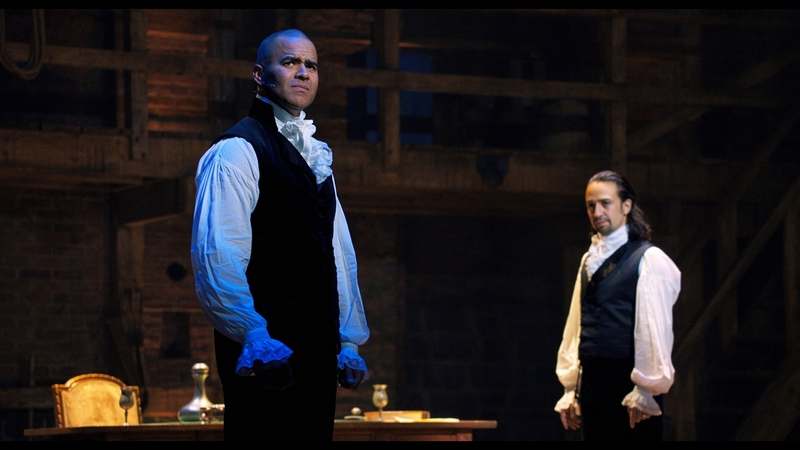
Paradoxically, Hamilton’s sense of affirmative stewardship allowed me to better focus on its overall artistry, which is—and I believe in the industry they call this a cold take—very good. Miranda isn’t much of a singer, and his favoring of lightning-fast hip-hop inevitably means that certain lyrics get drowned out, especially in the ensemble numbers. (Subtitles are of course available, though I don’t recommend them unless you feel thoroughly overwhelmed.) But his songwriting is both literate and alacritous, with punchy rhymes and swelling refrains. I particularly appreciate his use of sharp, staccato interruptions; his erudite lyrics are full of phrases like “in loco parentis” and “revolutionary manumission abolitionists”, but they also make room for the occasional “Oh shit!” “Whaaaat?” and—my personal favorite—“Awesome. Wow.” (Bonus points for the line, “Immigrants, we get the job done,” which has surely acquired even more resonance now than it carried in 2015.)
And while Miranda’s voice can’t match his pen, that matters less when he’s surrounded himself with such gifted performers. The obvious highlight is Daveed Diggs as Thomas Jefferson, whom the Blindspotting star portrays with a mesmerizing combination of flamboyance, intelligence, and contempt. (As with several cast members, Diggs pulls double duty, also earning some laughs as Marquis de Lafayette.) But there’s also the splendid Christopher Jackson (as George Washington), arguably the cast’s best soloist, as well as a wonderful turn from Leslie Odom Jr., whose Aaron Burr is simultaneously the story’s primary villain and its wounded, tragic hero. And though I was more fascinated by Hamilton’s career exploits than his marital and parental troubles—when Jefferson introduces a new number with the line, “Can we get back to politics?” I found myself nodding—both Phillipa Soo (as Hamilton’s wife, Eliza Schuyler) and Renée Elise Goldsberry (as her elder sister, Angelica) broaden the show’s scope, with their wistful yearning as well as their vocal range.
It is a show, of course. But while the cognitive dissonance of this movie-fied version of Hamilton is unavoidable, it isn’t unpleasant. It lies not only in the instructive tension between the production’s plot and its cast—that the characters throwing off the yoke of a tyrannical regime are played by Black and Latinx actors further complicates the already-fraught process of how we think about U.S. history—but also in its very form, the way it attempts to link the stage with the screen. I’ll always remember enjoying Hamilton. I’ll also never forget the unusual quality of my experience—that it was the living room where it happened.
Eurovision Song Contest grade: C+
Hamilton grade: B+
Jeremy Beck is the editor-in-chief of MovieManifesto. He watches more movies and television than he probably should.
